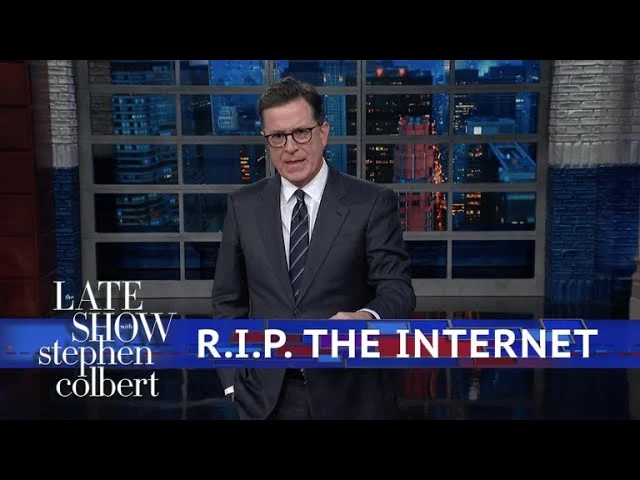
In 2017, late-night host Stephen Colbert told his audience that it was “a sad day” because the Federal Communications Commission (FCC) had voted to repeal Net Neutrality, an Obama-era rule that required Internet Service Providers (ISPs) to offer “equal access” and speeds to all lawful websites and content regardless of their source, and prohibiting “fast lanes” for certain content.
“What that really means, it means repealing regulations that prevented your Internet provider from blocking certain websites or slowing down your data,” Colbert said. “Now they can. And that’s wrong.”
Repeal of these regulations didn’t just portend the death of the Internet. It marked the triumph of Russia, Colbert suggested, pointing to FCC Commissioner Jessica Rosenworcel’s claim that a half-million public comments came from “Russian email addresses.”
“C’mon, Russia,” Colbert said. “Can’t you just leave America alone?”
The implication was clear. Killing Net Neutrality would destroy the Internet (and may have been a Putin plot).
Colbert was not the only person to make such claims, of course. Senate Democrats said that if we failed to save Net Neutrality, we’d get the Internet “one word at a time.” Actor Mark Ruffalo said that repeal was an “authoritarian dream,” and actress Alyssa Milano called it a threat to democracy itself.
CNN was slightly less hyperbolic, calling repeal of the regulation “the end of the Internet as we know it.”
Six Years Later
CNN was right, in a sense. The repeal of Net Neutrality — which occurred in 2018 with the FCC’s “Restoring Internet Freedom Order” — did mean the end of the Internet as we knew it.
Anyone reading this article can see the Internet didn’t die (hooray!). But few may realize just how much the Internet has improved since Net Neutrality was repealed.
Data released by FCC commissioner Brendan Carr, the former general counsel of the regulatory body, show that not only did the Internet not die; speeds got exponentially faster. According to data from Ookla, a global leader in Internet access performance metrics, median fixed download speeds have increased by 430 percent since 2017. Median mobile download speeds have increased even more — by 647 percent, a more than sevenfold surge.
Internet speeds didn’t just get faster, however. They became less expensive in real dollars.
“In real terms, the prices for Internet services have dropped by about 9 percent since the beginning of 2018, according to BLS CPI data,” Carr points out. “On the mobile broadband side alone, real prices have dropped by roughly 18 percent since 2017… and for the most popular broadband speed tiers, real prices are down 54 percent…”
This is just one part of the Internet boom that occurred following the repeal of Net Neutrality. As the Wall Street Journal recently noted, Internet access also exploded.
In 2015, 77 percent of Americans had access to high-speed broadband. By January 2020, that figure had risen to 94 percent, and it didn’t stop there, the paper notes. In 2022, some 400,000 miles of fiber were laid by broadband engineers — more than double that of 2016.
All of this investment didn’t happen accidentally. It was spurred by a return to laissez-faire Internet regulations reminiscent of the earlier days of the Internet, and was predicted by those who opposed Net Neutrality.
“It’s basic economics,” former FCC head Ajit Pai said. “The more heavily you regulate something, the less of it you’re likely to get.”
Pai’s point deserves attention. Supporters of Net Neutrality argued that the policy was necessary to keep ISPs in line so they didn’t rig the game against consumers in pursuit of higher profits.
But it was precisely the lack of regulation (and the pursuit of profits) that spurred the Internet boom. Companies seeking profit poured capital into Internet services in an effort to attract customers by offering a better, faster, and less-expensive product than their competitors.
Internet prices fell and service improved as a result, despite widespread fears that it would result in the “end of the Internet.” Why so many leftists might have genuinely believed the Internet would break without a federal bureaucracy holding its hand can perhaps be found in the views of the father of socialism, Karl Marx.
Marx saw competition — especially market competition — as a destructive force:
Competition engenders misery, it foments civil war, it ‘changes natural zones,’ mixes up nationalities, causes trouble in families, corrupts the public conscience, ‘subverts the notion of equity, of justice,’ of morality, and what is worse, it destroys free, honest trade, and does not even give in exchange synthetic value, fixed, honest price. It disillusions everyone, even economists. It pushes things so far as to destroy its very self.
The great Austrian economist Ludwig von Mises knew better. He saw market competition as the engine of economic production — “the sharper competition, the better” — which is why he disliked comparisons of competition to war.
“The function of battle is destruction; of competition, construction,” he noted in his 1922 book Socialism.
The Revival of Net Neutrality
The rapid expansion of Internet services over the last six years shows that Pai and Mises understand economics better than Net Neutrality proponents (and Karl Marx). Deregulation spurred investment and market competition, which ultimately resulted in a better Internet — not the end of the Web.
Alas, even though the apocalyptic predictions never materialized, Net Neutrality is back.
Last month, the FCC voted, by a 3–2 margin, to reinstate the policy in an attempt to, in CNN’s words, “reassert its authority over an industry that powers the modern digital economy.”
What’s astonishing is that you wouldn’t even know the amazing story about the explosion in Internet services (or the failed predictions of 2017–18) if you read a news story about the reinstatement of Net Neutrality.
The Associated Press mentions not a single word about the failed predictions or the improved speed and affordability of Internet services. Instead, we’re given this nugget from FCC Chairwoman Jessica Rosenworcel: “In our post-pandemic world, we know that broadband is a necessity, not a luxury.”
CNN, PBS, and numerous other media outlets ran similar stories that failed to mention either the doomsday predictions or the explosion of Internet services over the last six years.
One media outlet conceded that the sky didn’t fall following repeal of the regulation, but argued that this was because Net Neutrality never really left, since public scrutiny and state governments kept ISPs in line following repeal.
“And so, it is fair to say we haven’t seen a world without Net Neutrality,” Stanford Law professor Barbara van Schewick, a Net Neutrality supporter, told NPR.
‘Cyber-Libertarianism’ and the Internet
It’s nice to see NPR recognize the value of federalism, one of the most important checks on centralized power in the American system. Yet Schewick’s point that states have the power to regulate ISPs was curiously missing from the #savetheinternet campaigns of 2017–18. And there’s a reason for this.
The reality is, Net Neutrality was never truly about “saving” the Internet. (If it was, we wouldn’t be witnessing new efforts to impose it even though the Internet has grown far more accessible and affordable in its absence.)
Net Neutrality is about controlling the Internet.
From the beginning of the commercialization of the Internet in the 1990s, the US adopted a largely laissez-faire approach to the Internet, a standard set during the Clinton administration.
John Palfrey, a law professor who ran Harvard’s Berkman Center for Internet & Society, said there was a term for this “hands-off regulatory approach”: cyber-libertarianism.
Cyber-libertarianism unleashed a wave of innovation in e-commerce and social media, he said, which led to an explosion of wealth unparalleled in US history with the possible exception of the Gilded Age. And though other countries such as China would also make strides, Palfrey said the results of the laissez-faire approach are apparent.
“The United States remains the undisputed leader in virtually all aspects of the Internet, digital media, and computing early in this new millennium,” he explained in a 2021 Harvard Law School interview.
Yet, Palfrey does not see “cyber-libertarianism” as a success. He regards it as a threat and a failure.
“It made a small number of people — mostly men, mostly highly educated, mostly white and Asian — fabulously wealthy,” Palfrey said. “We need a regulatory regime today for technology that puts the public interest first, with equity and inclusion as a design principle and not an afterthought.”
Like many others, Palfrey believes the Internet should be regulated as a public utility. He believes the current system gives too much to a handful of billionaires “all of whom happen to be men and white.”
Net Neutrality has been sold to the public as a policy that will prevent Internet providers “from blocking certain websites or slowing down your data.”
This isn’t a power politicians and bureaucrats fear so much as they envy, which is why they’re seeking to loosen private control over the most powerful communication system in the world “in the interest of a more just and inclusive economy and our very democracy.”
Once one realizes that Net Neutrality isn’t so much about creating a better Internet as much as a key step toward an Internet under government control, the push to revive the policy makes a whole lot more sense.
This article originally appeared in The Daily Economy at AIER.org.


